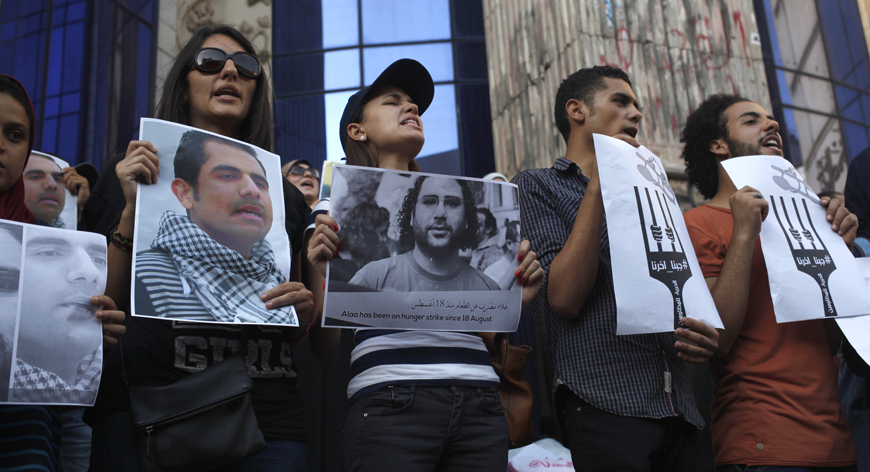Egypt Uses Draconian Law to Muzzle Dissent

The military regime in Egypt issued, illegally by executive decree, an unconstitutional law banning all forms of assembly, requiring prior permission by the police, and meting out prison terms of up to 15 years for committing the 'crime' of waging a peaceful demonstration without permit.
Moreover, the law was implemented by a delinquent police force not above forging false charges with bought out judges handing down the maximum sentences provided by the unfair law, or the requirements of fair trial, on even little children. In addition, a 'presidential' decree abolished the statutory upper limit on the duration of provisional detention pending investigation and trial, making provisional detention a punishment by imprisonment that can be by handed down by administrative decision indefinitely.
In a bid to crush the spirit of popular revolt ,the law was used to persecute in particular youth activists, the heart and soul of the popular revolt.
To help enforce the unfair law, army and police tanks and armoured vehicles were deployed in main squares and streets. In particular, the famous Tahrir square, birthplace and icon of the popular uprising , as well as it underground station, was sealed off for many months in a row.
That was the fate of the first goal of the popular uprising, freedom was cruelly trampled on by heavy military boots. Less than a year from the official inauguration of the ruling president, tens of thousands were languishing in prisons so crowded that new prisons had to be built in a hurry. Many ended up dead during incarceration due to, deliberate?, lack of medical care with the official explanation invariably being: "sudden drop in the circulatory system".
In October 2015, a presidential decree sanctioned use of force against prisoners for a multitude of reasons including merely "refusing to obey an order".
The coup de grace, however, came when the president instructed the security forces, to shoot to kill suspected opponents on sight, in order to ensure swift justice, thus suspects opponents came to be liquidated on sight, with the mise-en scene of throwing arms next to their bodies and photographing the scene of the crime. The official media and government statements took pride in using the revolting term "liquidation".
The second major victim of the junta was the second goal of the popular uprising: social justice.
Many actions and decrees of the regime and its front civilian governments showed that a coalition between the military establishment and big capital was in control of the country that is being run for their benefit.
These were the masters of "new" Egypt and the rest, the vast majority of the population were their slaves. An intermediate layer of slave drivers, consisting of the army, police, pliant judiciary and sycophant media anchors in media platforms owned either by the government or big capitalists, were rewarded with huge financial benefits, at short intervals, sometimes with ludicrous justification as well as high prestige perks, like being guests of honour at presidential functions.
A major indication of the lack of concern for social justice has been the military regime's failure to legislate and enforce the constitutional requirement of a minimum and a maximum wage-income limit. When an upper limit was legislated under popular pressure, subsequent administrative decrees excluded many categories of employees in privileged sectors, belonging to the class of masters and slave drivers, from its domain that it nearly lost its egalitarian purpose.
Taxation is another important case in point. Huge amounts, 11 billions of Egyptian Pounds (EPs) in one case, of evaded taxes by one ultra-rich family were forgiven by a presidential decree. A minor ( 0.5%) tax on capital gains was cancelled after the business community objected. The tax rate on the highest income bracket was in fact reduced while excessive indirect taxes, known to disfavour the poor, were imposed.
While the military went on an ostentatious buying spree of expensive armament. The poor were further punished with rampant inflation fuelled by higher fuel prices, due to the government discontinuing fuel subsidies and the systematic devaluation of the EP versus the US dollar , in an economy critically dependent on imports. Both mechanisms raised the prices of all services and commodities.
Thus, in addition, to unashamed oppression by destroying key freedoms, the military regime was faithfully implementing an even more vicious version of the new liberal "Washington Consensus" of savage runaway capitalist policies that resulted in the impoverishment of the masses under the previous stage of the same authoritarian rule regime.
However, to their eventual detriment, in their rush to capture the polity and the economy the MLTE were re-creating the objective conditions that prompted the popular uprising in 2011.



